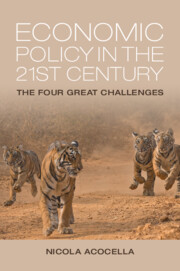Book contents
- Economic Policy in the 21st Century
- Economic Policy in the 21st Century
- Copyright page
- Dedication
- Contents
- Figures
- Tables
- Boxes
- Abbreviations
- Introduction
- 1 The Great Recession and the Pandemic
- 2 Stagnation
- 3 Efficiency, Poverty and Inequalities
- 4 Globalisation
- 5 Pulling the Strings of Our Arguments
- Conclusions
- Glossary
- References
- Index
- Author Index
4 - Globalisation
Published online by Cambridge University Press: 27 October 2022
- Economic Policy in the 21st Century
- Economic Policy in the 21st Century
- Copyright page
- Dedication
- Contents
- Figures
- Tables
- Boxes
- Abbreviations
- Introduction
- 1 The Great Recession and the Pandemic
- 2 Stagnation
- 3 Efficiency, Poverty and Inequalities
- 4 Globalisation
- 5 Pulling the Strings of Our Arguments
- Conclusions
- Glossary
- References
- Index
- Author Index
Summary
Apart from some parentheses, globalisation has proceeded over time, due to various factors, of a technical nature and of an economic policy kind. Among the latter, a cooperative international political-institutional environment plays a decisive role, which can help explain the sustained pace of globalisation after WWII. The consequences of globalisation on efficiency can be different in the short run, when they are generally positive, and in the long run, when they can be negative if globalisation leads to an increased degree of monopoly. As to equity, the effects in single countries are beneficial for some people and negative for others. A similar impact can derive from globalisation on different countries. However, it should be recalled that ungoverned globalisation can lead to economic imbalances, which raises the need for some kind of international coordination. In the recent decades this has proceeded with beneficial effects, but in the last few years notable oppositions have grown, in particular by China and the United States, leading to tariff wars and the like.
Keywords
- Type
- Chapter
- Information
- Economic Policy in the 21st CenturyThe Four Great Challenges, pp. 131 - 182Publisher: Cambridge University PressPrint publication year: 2022

